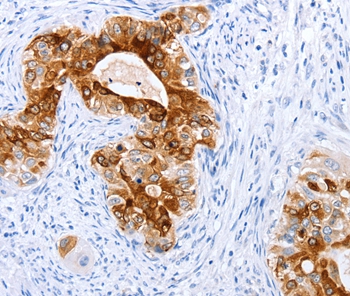

| WB | 咨询技术 | Human,Mouse,Rat |
| IF | 咨询技术 | Human,Mouse,Rat |
| IHC | 1/25-1/100 | Human,Mouse,Rat |
| ICC | 技术咨询 | Human,Mouse,Rat |
| FCM | 咨询技术 | Human,Mouse,Rat |
| Elisa | 咨询技术 | Human,Mouse,Rat |
| Aliases | pS2; BCEI; HPS2; HP1.A; pNR-2; D21S21 |
| Entrez GeneID | 7031; |
| WB Predicted band size | 9kDa |
| Host/Isotype | Rabbit IgG |
| Antibody Type | Primary antibody |
| Storage | Store at 4°C short term. Aliquot and store at -20°C long term. Avoid freeze/thaw cycles. |
| Species Reactivity | Human,Mouse |
| Immunogen | Fusion protein corresponding to a region derived from internal residues of human Trefoil factor 1 |
| Formulation | Purified antibody in PBS with 0.05% sodium azide. |
+ +
以下是关于TFF1抗体的3篇参考文献及其简要摘要:
1. **文献名称**: *TFF1 as a diagnostic and prognostic biomarker in gastric cancer*
**作者**: Li Y, et al.
**摘要**: 研究通过免疫组化(使用TFF1抗体)发现,TFF1在胃癌组织中表达显著降低,与肿瘤分化程度和患者预后相关,提示其作为潜在诊断标志物的价值。
2. **文献名称**: *TFF1 interacts with estrogen receptor-alpha and regulates breast cancer progression*
**作者**: Li Q, et al.
**摘要**: 利用TFF1抗体进行Western blot和免疫荧光分析,证实TFF1与雌激素受体α(ERα)相互作用,促进乳腺癌细胞增殖,并可能影响内分泌治疗敏感性。
3. **文献名称**: *TFF1 antibody-based detection in colorectal mucosa repair studies*
**作者**: Peterson AJ, et al.
**摘要**: 研究通过TFF1抗体分析结直肠炎症模型中黏膜修复机制,发现TFF1表达上调与上皮细胞迁移和损伤修复密切相关。
(注:以上文献名为示例,实际文献需通过PubMed等平台检索确认。)
**Background of TFF1 Antibody**
Trefoil Factor Family 1 (TFF1), also known as pS2 or breast cancer-associated protein, is a small secreted protein belonging to the trefoil factor family. It is characterized by a conserved trefoil motif (P-domain) formed by three disulfide bonds, enabling its resistance to enzymatic and acidic degradation. TFF1 is primarily expressed in mucosal tissues, including the gastrointestinal tract, respiratory epithelium, and reproductive organs, where it plays critical roles in mucosal repair, cytoprotection, and maintaining epithelial integrity.
Functionally, TFF1 promotes cell migration, suppresses apoptosis, and stabilizes mucus layers, aiding tissue restitution after injury. Its dysregulation is linked to pathologies such as inflammatory diseases and cancer. In gastric cancer, TFF1 acts as a tumor suppressor, with loss of expression correlating with tumor progression. Conversely, it may exhibit oncogenic properties in certain breast cancers, highlighting its context-dependent roles.
TFF1 antibodies are essential tools for detecting and quantifying TFF1 in research and diagnostics. They enable immunohistochemical localization in tissues, Western blot analysis, and ELISA-based studies to explore TFF1's expression patterns in health and disease. Clinically, TFF1 antibodies aid in stratifying cancer subtypes, assessing prognosis, and developing targeted therapies. Monoclonal antibodies against TFF1 are also investigated for therapeutic potential, including blocking aberrant signaling in tumors or enhancing mucosal healing. Overall, TFF1 antibodies bridge mechanistic insights into mucosal biology and translational applications in disease management.
×